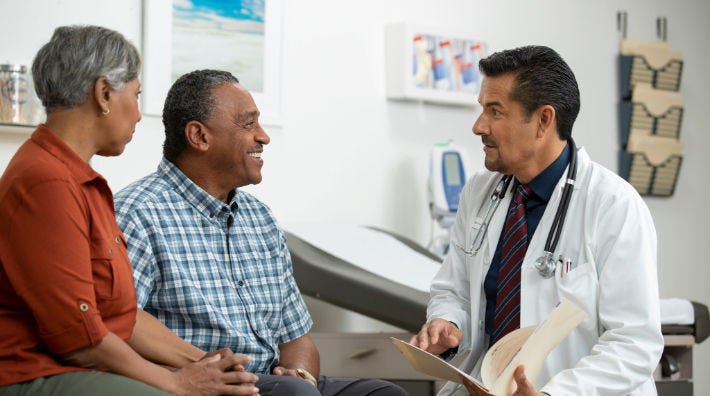What Men Need to Know About Inherited Cancer Risk

About 1 in 10 cancers are caused by an inherited genetic mutation, according to the National Cancer Institute. But many men might not know they have an inherited cancer risk — or what to do about it once they find out.
“It’s important for men to know whether they have an inherited cancer risk so we can identify the need for screening and potential preventive interventions for both them and their first-degree relatives,” said David Ilson, MD, PhD, an American Society of Clinical Oncology (ASCO) expert and medical oncologist at Memorial Sloan Kettering Cancer Center. First-degree relatives include parents, siblings, and children.
Genetic testing looks for certain gene mutations that could mean a higher risk for cancer. Doctors often recommend this testing to people who have a strong family history of cancer. However, studies show men are less likely than women to be aware they have an inherited cancer risk. If a person doesn’t know their family’s cancer history, their doctor won’t either. Not knowing your family history might affect the types of cancer screening tests recommended for you. It could also affect the cancer screening schedule you follow.
What kinds of cancer can men inherit?
Some types of cancer run in families, but the cancer itself doesn’t get passed down. Rather, people can inherit a gene mutation that may put them at higher risk for certain cancers. For example, men with inherited mutations in the BRCA1 or BRCA2 genes are at higher risk of developing prostate cancer, pancreatic cancer, and breast cancer.
Some men might also inherit a family cancer syndrome that increases their cancer risk. For instance, Lynch syndrome can put men at higher risk for colorectal cancer and several other types of cancer. This inherited condition can be diagnosed with genetic testing that identifies mutations in certain genes.
How can men learn about their inherited cancer risk?
You’ll need to collect your family history of cancer. Ask your close relatives if they’ve ever been diagnosed with cancer or any type of pre-cancers or precancerous cells or tumors. You should also ask if they’ve received any screening tests, blood tests, or genetic testing that show they might have an increased cancer risk.
Talk with your immediate family and your aunts, uncles, and grandparents about their cancer history. If you’re not able to ask your relatives, talk to your doctor. They can help you understand how to assess your risk.
For men with a known or strong family history of cancer, the doctor may recommend genetic testing. This might also happen if someone doesn’t know their family history of cancer.
“Genetic testing identifies the need for screening and potential preventive interventions,” said Dr. Ilson. For instance, if testing shows a gene mutation, you may need to get cancer screening more often or start screening earlier. Or your doctor might recommend taking certain steps to help prevent cancer. They may suggest regular aspirin use or quitting smoking, for example. Your doctor may even recommend surgery to prevent certain types of cancer. However, Dr. Ilson notes that surgery to prevent cancer is less common in men than in women.
How can men reduce their cancer risk?
You can’t change whether you have a higher inherited risk of cancer. But you can get recommended cancer screening tests at the appropriate times. Ask your doctor for the tests and timelines that are right for you.
Other steps you can take to reduce your overall cancer risk include:
- Get regular exercise.
- Get to and maintain a healthy weight.
- Quit drinking alcohol.
- Stop smoking.
- Stick to a healthy diet.
- Prevent HPV (human papillomavirus) infection.
- Protect your skin from ultraviolet (UV) rays.
You can also use online tools to learn how to lower your cancer risk. The ACS CancerRisk360 assessment asks questions to find out which factors may be increasing your cancer risk. Then it gives you an action plan with steps you can take to protect yourself against cancer.
To find out more about whether you have an inherited cancer risk, talk to your doctor. Questions to ask include:
- Based on my family history, is it possible I have an increased risk of cancer?
- If so, do you recommend genetic testing for me?
- How could having an inherited cancer risk affect my cancer screening?
- How can I monitor for cancers I may be at higher risk for?
- What do you recommend I do to lower my overall cancer risk?
Dr. Ilson is a member of ASCO’s Patient Information Editorial Board.
- Written by

Written by the American Society of Clinical Oncology (ASCO) with medical and editorial review by the American Cancer Society content team.



